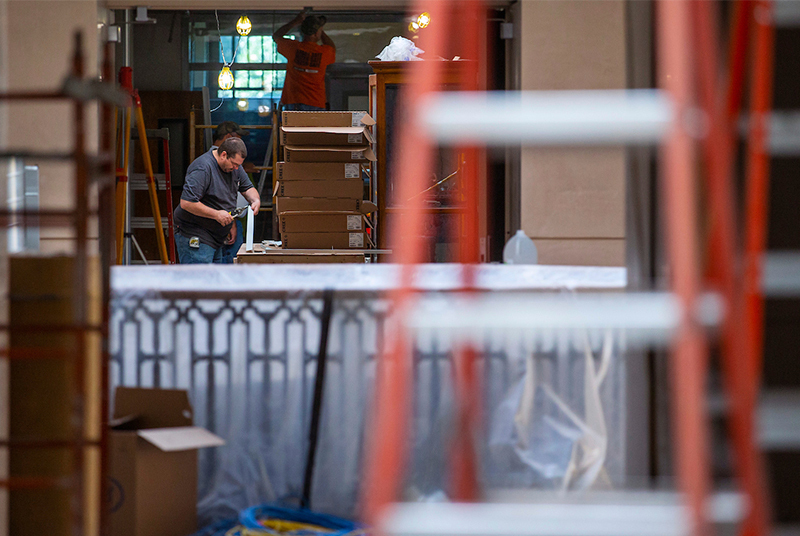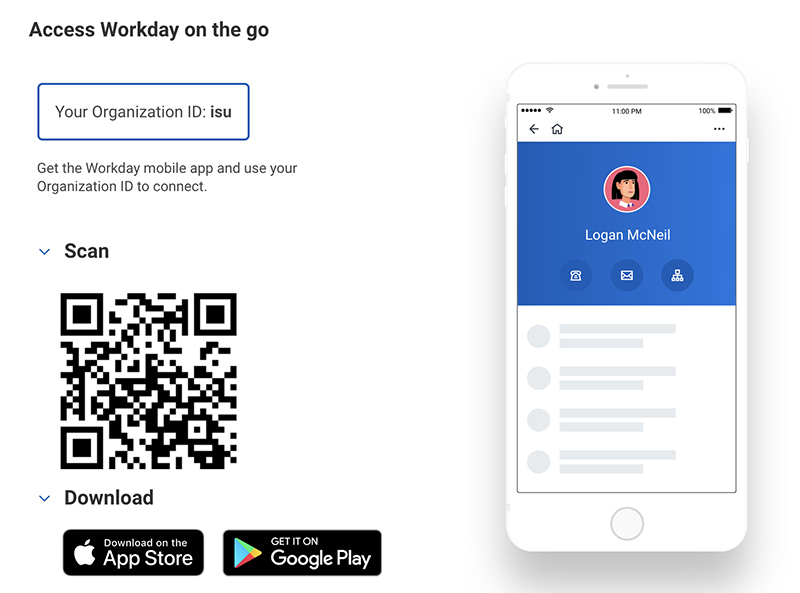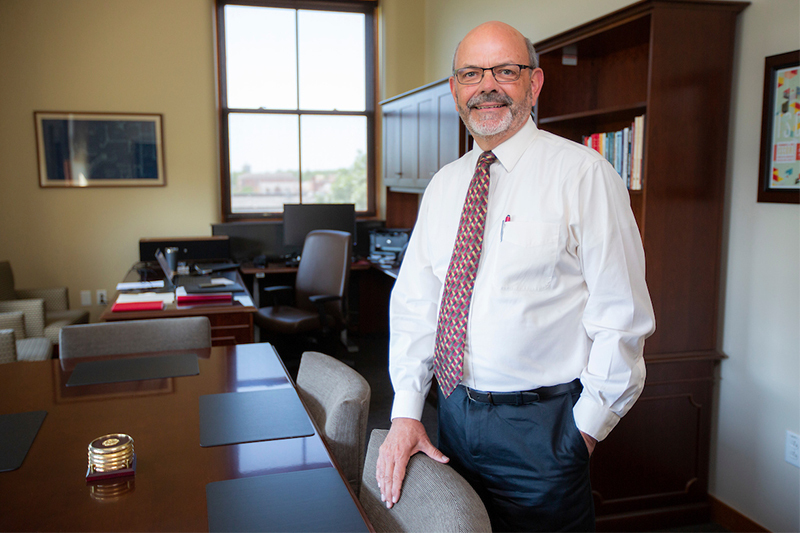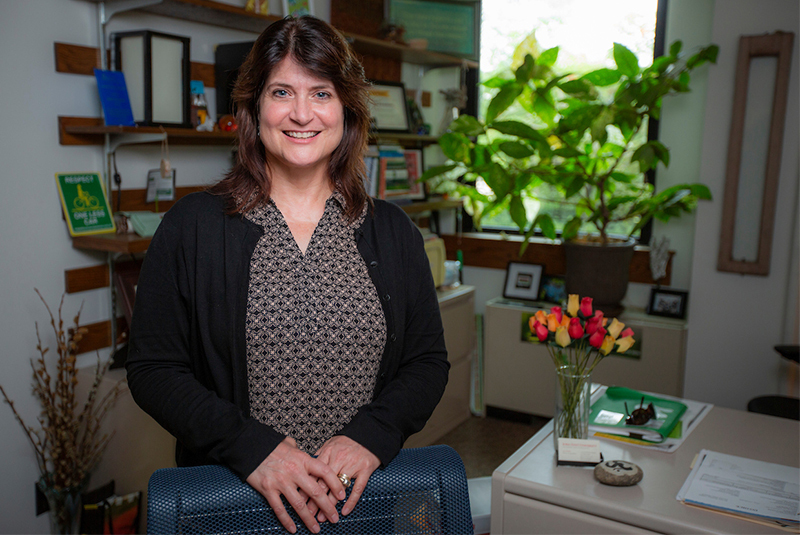Curtiss craftsmen

Photo by Christopher Gannon.
Al Roche, R&C Acoustical of Ames, prepares metal segments for the new ceiling framework in the south wing of Curtiss Hall's top floor earlier this week. In the foreground is the railing for Curtiss' signature central rotunda. The $2.3 million renovation project to the third floor began in January.
Project manager Kerry Dixon, facilities planning and management, reports that the demolition and rebuilding phases are complete, painting will wrap up next week and doors and glass installation will begin the last week of July. Furniture installation is scheduled for early August, with the goal of moving English department lecturers and graduate assistants into their new spaces near Aug. 15. Returning to Curtiss Hall by the end of August will be the College of Agriculture and Life Sciences' communications, development and IT units.
Workday: There's an app for that
WorkCyte story archive
New to ISU or need to catch up on the WorkCyte project? Visit Inside's archive of stories following project developments since Iowa State chose the Workday system in 2016.
Do you travel for work? Are you comfortable using a mobile device? Would you like to get work done between meetings or while away from your desk? Workday has a free mobile application that makes it easy to work on the go.
"The benefit of using the mobile app is the ability to access Workday quickly, easily and anywhere. You don't need to be tethered to your desktop," said Kumari Henry, change manager in information technology services (ITS).
Henry said the look and feel is a little different, but users can seamlessly move between the mobile and computer interfaces because Workday is a cloud-based system. She said more than 3,000 Iowa State employees have downloaded the mobile app. Senior vice president and provost Jonathan Wickert was an early adopter, approving a transaction on Day One of go-live.
Henry said the mobile app can be used for many Workday activities. The most popular are:
- Reviewing and approving transactions
- Requesting time off
- Submitting expenses
"We recognize that not everyone has a mobile device, but this offers users another tool," Henry said.
Roles assigned to users within Workday may limit their mobile capabilities, and some functions -- reports, for example -- are not available due to the limited screen size.
Henry said nonexempt employees who don't use a physical timeclock to track their working hours may be able to use the mobile app to check in and check out.
"The option is available," she said. "Employees need to work with their supervisors to enable it."
Travel advantage
Users can photograph and submit receipts via the mobile app while on the road. However, this option applies only to travel and hospitality expenses, not to purchasing card (P-card) transactions.
Henry said the more the app is used for expense reporting, the smarter it gets. Workday "learns" to recognize the date, purchase amount and vendor name on receipts and populate the information fields in the system.
Download help
The Workday mobile app is available in the Google Play and Apple app stores. Job aids with step-by-step instructions for installing the app on Android and Apple devices are available on the WorkCyte website (click on the "Resources" menu, then "Workday General").

To set up the Workday mobile app, enter the company code (isu) or scan the QR code.
Welcome

James L. and Katherine S. Melsa Dean of Engineering Sam Easterling. Photo by Christopher Gannon.
Alumnus W. Samuel (Sam) Easterling, formerly the Montague-Betts Professor of Structural Steel Design and head of the civil and environmental engineering department at Virginia Tech University, Blacksburg, began serving as the James L. and Katherine S. Melsa Dean of Engineering on July 15.
Easterling had been a member of the Virginia Tech faculty since 1987, the year he completed a doctorate in structural engineering from Iowa State. He served as department head in civil and environmental engineering for the last decade.
In addition to his doctoral work at Iowa State, Easterling earned bachelor's and master's degrees in civil engineering from West Virginia University, Morgantown. He is a registered Professional Engineer and a fellow of both the American Society of Civil Engineers and Structural Engineering Institute.
He succeeds Sarah Rajala, who retired from the university last month.
Easterling's office is in 4100 Marston Hall. He can be reached by email at wse@iastate.edu, by phone at 294-9988.
FY19 sets record for external research funding
Iowa State University attracted $469 million of total external funding for the fiscal year ending June 30. That's a 7.9 percent decrease from fiscal year 2018's record total of $509.2 million.
Total external funding for fiscal year 2019 is the third highest reported by Iowa State, following records in fiscal years 2018 and 2017. The record years included significant gifts benefitting the College of Liberal Arts and Sciences and the Ivy College of Business.
External funding includes grants, contracts, gifts and cooperative agreements from federal, state and local governments as well as from corporations, nonprofits and other universities for research, academic support, scholarships and more.
The fiscal year 2019 total also includes a record $260.9 million of external support for Iowa State research, a 6.2 percent jump over the previous fiscal year's $245.8 million. The previous record for research funding was $252.5 million during fiscal year 2016.
External research funding included a record $181.1 million in federal funds (the previous record was $174.7 million in fiscal year 2016) and a record $79.8 million in non-federal funding (the previous record was $77.7 million, again in fiscal year 2016).
"These figures indicate that as a top land-grant university, Iowa State excels at leveraging state resources to attract external support for academic, research and creative activities," said President Wendy Wintersteen. "Record research funding helps place our faculty at the forefront of innovative discoveries and economic opportunities that make our state more competitive and improve lives in Iowa and beyond."
External research funding supported more than 1,300 research projects during FY 2019, including projects to study structural biology at the molecular level, develop a nanovaccine for the flu, identify catalysts that lead to biorenewable chemicals and build a data system that helps inform policy about the care and education of young children.
"The record-high external research funding the university achieved in 2019 directly reflects the value our sponsors place on our faculty's focused, purposeful approach to research," said vice president for research Sarah Nusser. "Whether it's foundational or translational, sponsors understand the research performed by Iowa State answers questions and delivers solutions to the challenges we face within the state, across the nation and around the world."
ISU: FY19 major sources of total external funding
|
Federal agencies |
$237.1 million |
|
Energy |
$87.7 million |
|
Agriculture |
$42.4 million |
|
National Science Foundation |
$35.1 million |
|
Education |
$32.3 million |
|
Health and Human Services* |
$19.3 million |
|
Commerce |
$6.5 million |
|
Defense |
$5.7 million |
|
Other federal |
$8.1 million |
|
Non-federal sources |
$231.9 million |
|
Individual |
$100.1 million |
|
Industry/corporate |
$49.8 million |
|
State of Iowa |
$28.9 million |
|
Nonprofit organizations |
$26.9 million |
|
Higher education |
$17.3 million |
|
Commodity groups |
$7.4 million |
|
Other non-federal |
$1.5 million |
|
Total |
$469 million |
*Includes National Institutes of Health
Have a Workday concern? Check out rundown of known issues
Workday by the numbers
As of July 12, 6,800 employees had logged on, performing 159 unique types of business processes. The 111,957 transactions include:
- 7,535 requests for time off
- 2,835 costing allocations assigned
- 1,204 hires and rehires
- 985 purchase orders
- 756 benefit changes/life events
- 709 photos uploaded
Despite the inevitable wrinkles posed by the shift to Workday, Iowa State's chief information officer (CIO) told the Professional and Scientific Council she's cautiously optimistic after the new system for finance and human resources transactions launched July 1.
Presenting to the council at its July 11 meeting, interim vice president and CIO Kristen Constant credited the relatively smooth transition to the diligence of employees working on the project.
"We continue to have a very committed team. And not just the central team. There are people all over campus who are working hard to make things work," Constant said.
In addition to serving the specific needs of units, staff working on Workday implementation after go-live are collecting and addressing campuswide concerns, she said. A list of known issues on the Workcyte website will help efficiently share broader concerns.
The current list includes 10 known issues. Some were anticipated. For instance, emergency contact information for nonstudent employees intentionally wasn't transferred to Workday because a review of that data in AccessPlus showed much of it might be out-of-date, Constant said. Employees should resubmit the information in Workday.
Other issues are unavoidable hiccups any time complex information is transferred to a new system. That's why department affiliations and supervisory chains need to be checked and manually corrected in some instances. Supervisors need to verify all student employees and graduate assistants, and the known issues list provides a link to a tipsheet explaining how to do that.
Some problems were more surprising. Constant said the initial Workday settings allowed student employees a maximum of five different time clocks for campus jobs.
"It turns out, a lot of students have more than five jobs," she said, adding that one student had 13. Workday now allows students to have up to 30 jobs.
WorkCyte learning resources
- Online training courses
- Job aids with step-by-step instructions to help with Workday basics and common transactions
- User lab sessions that offer hands-on navigation experience with the Workday system
- "How Do I" help with finance transactions
WorkCyte help
- IT solution center (294-4000, email)
- ISD team members
- Finance service team (email)
- HR service team (email)
Constant also answered questions from council members, including a concern that Workday would force employees to pick a preferred pronoun. Current settings in the personal information section of Workday offer 21 pronoun options and more may be added, but employees don't have to select a preference. The default setting is no preference, she said.
"We didn't presume anything about anyone," she said.
Taking to training
Constant said 95 percent of employees took the introduction to Workday training sessions and 77 percent took the training on employee self-service. Among those expected to need these sessions, 91 percent completed the training for timekeepers and 77 percent completed the introduction to Workday for managers. Those figures likely will be even higher by the time the fall semester starts, she said.
"Training is something we hit hard, and I think the campus responded admirably," she said.
Constant said project leaders will incorporate feedback about the training programs when Workday is extended to student information, an expansion expected in the coming years.
"We're taking notes and making sure we have our lessons learned for the next implementation," she said.
Other council business
Council approved a motion asking university human resources to offer Crucial Conversations training to staff starting in January. The two-day program aims to make talking about sensitive subjects more constructive and could help address the council's long-standing goal to improve supervisor training. Before voting, council members discussed whether to first identify the cost or consider requesting similar programs based on existing in-house material.
ISU Extension and Outreach offers the $250-per-person program to its staff, county extension councils and volunteers a few times a year, but due to licensing rules, extension and outreach can't make the course available to other university employees. The university has offered the program to employees in the past, according to the motion.
Council members also met in small groups to propose potential 2019-20 strategic initiatives and action items, which they'll consider at their Aug. 1 meeting.
Five questions for the Live Green leader

Director of sustainability Merry Rankin and the initiative she leads passed the decade marker in January. Photo by Christopher Gannon.
The basics
Name: Merry Rankin
Position: Director of sustainability (since July 2010, 25% of her time has been contracted to the city of Ames to assist with its initiatives)
Time at Iowa State: 10.5 years
Education: B.S. in business, M.S. in wildlife biology, both from Iowa State
Staff: Up to seven student interns at a time; five at Iowa State, two at the city
As a staff of one, how have you learned to have influence or impact?
I think things get done and stay done and are embraced and impactful at a community level, not by someone pushing through an agenda. I try to support goals rather than institute mandates. The challenge when you say "Do good things" is people do the things they think make a difference. You get this incredibly impressive scatter plot with no tangent line on it. One of the things in the back of my head for all of these 10 years has been "How do we get the tangent line in place?"
We are in the process of establishing guiding principles, procedures and best management practices as a reference tool everyone could use. This plan would be used by campus units and also shared with vendors and contractors. The plan is based in STARS (Sustainable Tracking, Assessment and Rating System, sponsored by the Association for the Advancement of Sustainability in Higher Education).
Why STARS for Iowa State?
My interest in it (initially in 2012) was because we had no guiding framework for campus sustainability. STARS provided a benchmarking framework, from a third party that was well-vetted, so we could evaluate ourselves and highlight areas where we could put more effort. Initially, I used it just to cast light on what colleges and universities were doing and how we stack up. I also used it to look for opportunities that make good sense for Iowa State. The more we worked through the instrument, we realized we could go after certification.
Editor's note: Iowa State has twice received a STARS gold rating, 2013 and 2016, and will seek a third this fall.
Do you see your job as more about operations or education?
Some years, big policy-making components just weren't in the picture, so I'd look at areas where I could have an impact. And some years, that was in providing empowering experiences and opportunities for students. I now have a team of student interns. That's allowed us to grow our reach in student education that shapes their worldview when they leave Iowa State -- something as simple as when you go home at night, what types of decisions do you make? As a university, we have a responsibility to be a role model for the things we're asking people to do. But we're here to educate students. I think that's my more important role, and that's changed in my 10 years here.
What makes you proud about your first 10 years?
Not to take anything away from some significant accomplishments -- like our LEED (Leadership in Energy and Environmental Design) platinum buildings, our rich diversity of local foods, investments in wind and solar energy or STARS certification -- my favorite projects hit the breadth and depth of "community."
The first is the solar trash and recycling compactors. They have decreased campus litter and increased awareness. That project hits environmental, social and economic sustainability, and it shows you can make an impact with a small package in the seemingly mundanest of ways. At the end of the day, it's a trash can.
The Tidy Cat containers (to recycle used laboratory glass) were another example of making a big difference in the smallest of ways. It brought together so many people -- residents, businesses, animal shelters -- who wouldn't have known how they could support sustainability, but they all love cats. Stacks of the containers still show up in my office. An ISU alumna goes through one container a month, and once a year she FedExes 12 containers to campus. I love that these projects give people an opportunity to support a sustainable future.
Lots of people "take the job home." If I went to your house, could I tell what line of work you're in?
This was a job of extreme passion when I took it. It's who I am and how I was raised. So, yes, at home we have electronics on power strips we turn off when we're not using them, we have recycling and composting bins and pollinator plantings. I drive a car lacking many bells or whistles for better mileage, and I trip chain to be mindful of my travelprint. I use small amounts of leftover water, from meal prep or even the bottom of the dog dish, to water house plants. We invested in SunSmart Ames. We have lots of little stashes of things I need to take to someone who can use them -- wire hangers back to the dry cleaners, for example. Lately, we've been challenging ourselves to get plastics out of our life and reduce the volume we recycle. Still, there's plenty to do and I'll never stop challenging myself.
Updated hiring and employment policy offers more flexibility
An updated university policy on hiring and employment went into effect July 1, providing more flexibility and best practices for job searches, hiring and employee movement within the university.
New guidelines that accompany the policy, also effective July 1, include additional detail on general hiring and search procedures as well as specifics on promotions, transfers and demotions of professional and scientific staff. The policy and guidelines replace previous policies for P&S staff concerning open searches, changes in employee status, reclassification and reclassification salaries.
"The primary change is that we are giving more flexibility at the local level," said Emma Houghton, compensation and classification director for university human resources.
For instance, the minimum time for posting an open P&S or faculty position is now seven days, instead of 15 or 30 days. Merit jobs still require at least a 10-day posting per state Board of Regents merit system rules.
New guidelines also provide more flexible waiver parameters for open recruitment, requiring approval from the office of equal opportunity instead of the president. Fulfilling waiver requests usually is based on documented evidence that an open search would be unlikely to yield qualified candidates or would put at risk an opportunity to hire a member of an underrepresented group.
"Hiring managers will now have the flexibility to fill positions and promote high performers according to policy provisions instead of exploiting waivers to the former open search policy requirements," said Margo Foreman, assistant vice president for diversity, inclusion and equal opportunity. "My hopes are that the practice of work-arounds will not be necessary and waiver requests will be utilized to enhance diversity and equal opportunity according to best practice."
Formalizing common university practices, the guidelines for the first time spell out expectations for P&S interim assignments. For example, interim roles shouldn't exceed 18 months except in extraordinary circumstances, under the guidelines.
Based on feedback from senior leaders and through the comment period, the guidelines for starting salary for P&S staff who are hired and promoted will remain at the first third of the pay range. A draft version of the guidelines considered increasing the maximum salary for a promotional increase.
"We hope that in time we will be able to provide more flexibility around starting salaries and promotional salaries as we continue to make improvements to our P&S classification and compensation system. We intend to update the guidelines and the university as we make these considerations," Houghton said.
The revised policy and guidelines are among several July 1 policy library changes that incorporate Workday and service delivery teams. See the policy library for a list of updated policies.
